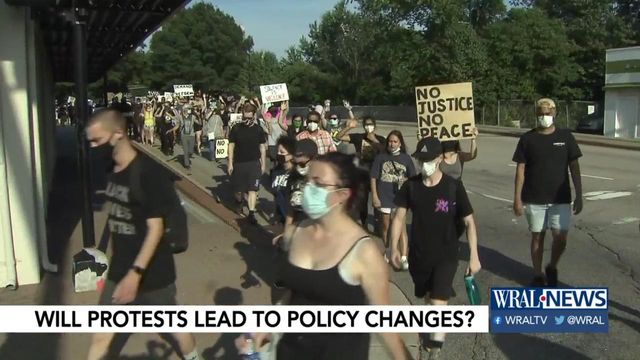Scant momentum at NCGA for police reforms, but promises to listen
There's little momentum for police reforms during this session of the N.C. General Assembly, though top legislative leaders said this week that protesters have legitimate complaints and that they'll listen on potential policy changes.
Speaker of the House Tim Moore announced a new bipartisan task force on the matter Thursday, but it won't meet until this session wraps, potentially in July.
Gov. Roy Cooper is expected to announce executive action on police issues soon, though it's unclear just what those measures will be. He promised during a Thursday afternoon press conference on COVID-19 issues to "keep listening" and said the message for marchers was: "We hear you, and there's more to come."
House Democrats announced a Friday press conference to call for "crucial first steps in addressing systemic racism." The General Assembly has moved forward on some criminal justice reform in recent years, but policing bills backed by Democrats have failed to move in the Republican-controlled General Assembly.
Lobbyists for law enforcement groups said Thursday they haven't been approached on new legislation, despite protests that have gripped North Carolina cities for nearly a week. This legislative session seems focused, for the most part, on COVID-19 responses and dealing with a $4 billion budget hole from revenue losses tied to the state's economic shutdown.
"And that's about it, according to the leadership," said Jeff Gray, who lobbies for the N.C. Fraternal Order of Police.

"I haven't heard from any legislators," said Eddie Caldwell, general counsel for the NC Sheriffs' Association. "Whenever those discussions are appropriate, they need to be well thought out and not rushed."
Senate President Pro Tem Phil Berger took a similar tack Thursday, saying he'd like to see more data on police encounters, though he acknowledged that data is likely to show "outliers."
"The question is how systemic is that," said Berger, R-Rockingham. "Is it just that you've got bad apples there? Is it that you've got bad apples there and there aren't sufficient measures in place to root out those problems?"
The Senate leader said he didn't have a timetable to answer these questions. He said there's a lot of emotion around these issues right now, "and trying to legislate based on that emotion is not the best way for us to proceed."
"But I think that emotion can drive us to looking more carefully at the issue," he said.
Moore said in a statement announcing his task force that "recent events have created a unique opportunity to address long-standing issues facing our society."
Lt. Gov. Dan Forest, a Republican running against Cooper in this year's governor's race, said during a Tuesday Council of State meeting that "obviously there are still a lot of difficult conversations to be had that are probably way past due in this country."
His press staff didn't address follow up questions on any proposals he plans to make.
Robert Dawkins, whose SAFE Coalition has pressed for a number of changes in recent years, said state leaders – including Cooper – often say these issues are important, but they don't prioritize them.
"It isn’t ever front and center," he said. "You don’t see the work behind it.”
Among other things, the SAFE Coalition has pressed the state to widen the authority for citizen review panels so they can take a closer look at police officer complaints and have a bigger say in discipline. There are at least two bills, filed more than a year ago, pending without action in the House.
Moore, R-Cleveland, said Thursday he wasn't familiar with those bills.
The General Assembly did pass major reforms in recent years called "Raise the Age." These bills said the state couldn't generally try 16 and 17 year olds as adults, and North Carolina was the last state in the country to make this move.
Other reforms had momentum last year, but got hung up in the House. The Second Chance Act, Senate Bill 562, would make it easier for people with nonviolent misdemeanor convictions to have those convictions erased from their publicly available criminal record. It passed the Senate unanimously last year but is awaiting action in the House.
The First Step Act, House Bill 511, would give judges more flexibility on drug charge minimum sentences. It passed the Senate unanimously in October and is awaiting House action.
State Rep. Chaz Beasley, D-Mecklenburg, said the General Assembly has "done better" on criminal justice reforms in recent years, and that is heartening.
"At the same time, we want the pace of this to be faster," he said.











